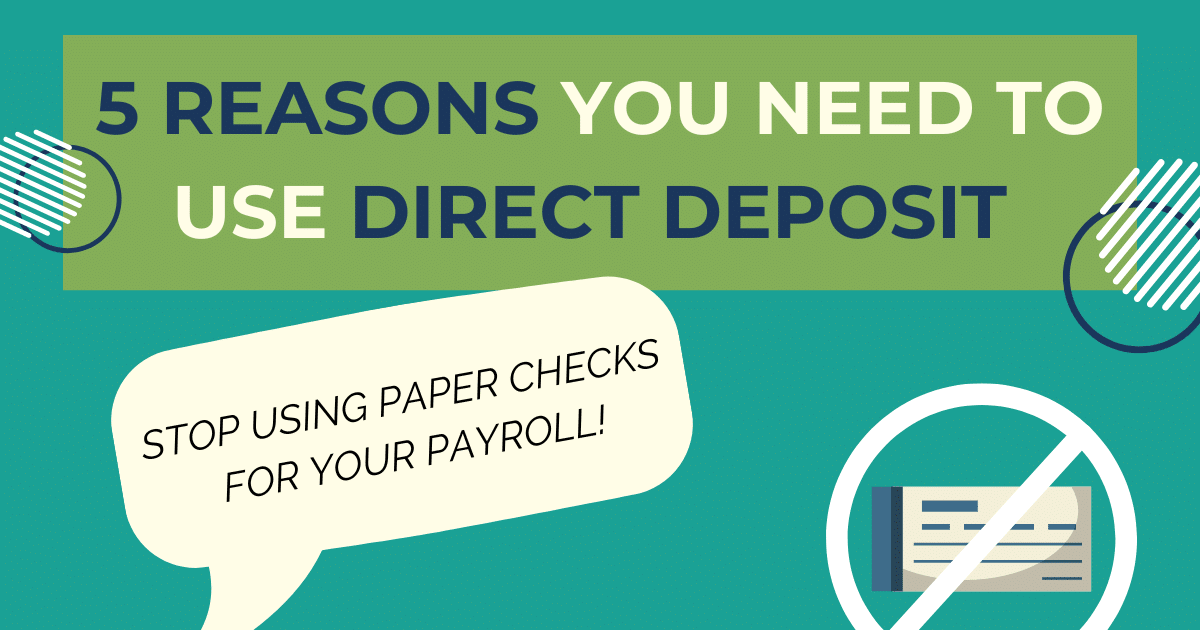5 Reasons You Need to Use Direct Deposit (STOP Using Paper Checks for Your Payroll)
August 17th, 2023 | 3 min. read
By TJ Noa

What would you do if you didn’t have to worry about getting a paycheck? I would move to the beach, lay in a hammock all day, and sip on a variety of tropical cocktails while listening to vintage French music. Sadly, for me at least, we do not live in such a world. In our reality, we all need to contribute in order to earn a living, and for most people that means spending our time working for someone else. As much as I enjoy coming to work, I would be hard-pressed to show up if I wasn’t getting paid, or at least enjoying a drink at the company bar. A paycheck is without a doubt the biggest reason employees go to work.
As an employer, you should make it a priority to ensure that the experience of getting paid is as convenient and reliable as possible. In today’s world, that means using direct deposits or pay cards to get your employees their wages. Here are five reasons to make the switch if you haven’t already.
Direct deposit is more efficient and convenient
One of the most apparent advantages of adopting direct deposit or pay cards over live checks is the enhanced efficiency and convenience they bring to the table. Traditional paper checks require manual preparation, printing, distribution, and then physical depositing to the employees. This process can be time-consuming and prone to errors, such as misplaced or lost checks, leading to unnecessary frustration for employers and employees.
On the other hand, direct deposit streamlines the payment process by electronically transferring funds directly into employees' bank accounts. This eliminates the need for employees to make trips to the bank to deposit checks, saving them valuable time and effort. Furthermore, it reduces administrative burdens on employers, freeing up their time to focus on more strategic tasks that drive the business forward.
Pay cards offer a middle ground between traditional checks and direct deposit. They provide employees with a reloadable debit card that employers can load with their wages. Employees can then use these cards to make purchases or withdraw cash from ATMs, just like a regular debit card. This option is particularly beneficial for employees who may not have access to a traditional bank account.
Direct deposit is more secure and reliable
Security concerns associated with paper checks cannot be overlooked. Checks can be lost, stolen, or even forged, potentially exposing both employees and employers to financial risks. Direct deposit and pay cards significantly enhance the security of payment transactions.
Direct deposit relies on encrypted electronic transfers, reducing the risk of misplaced or stolen checks. Employees don't have to worry about losing their physical checks or having them intercepted by unauthorized individuals. Similarly, pay cards are often equipped with robust security features, such as PIN numbers and fraud protection, to ensure the safety of the funds.
Your Employees will have faster access to their funds
Another compelling reason to embrace direct deposit or pay cards is the immediate access to funds they provide. Traditional paper checks may involve delays due to postal services or the need to physically deposit the check and wait for it to clear. In contrast, with direct deposit, employees can access their wages on payday without any unnecessary wait times. This prompt access to funds is particularly valuable in cases of emergency or unexpected expenses.
Pay cards offer a similar advantage, enabling employees to use their funds immediately upon loading. This is especially beneficial for employees who may not have a bank account, as it provides them with a practical and accessible means of receiving and managing their earnings. To learn more about pay cards, watch this video.
Direct deposit actually saves you money
While it might seem that electronic payment methods come with additional costs, they are often more cost-effective in the long run. Printing paper checks and covering delivery fees can add up, especially for businesses on a weekly payroll schedule. Direct deposit and pay cards can help mitigate these costs, making the payment process more efficient and economical.
It's inclusive to your employees and addresses their needs
A notable advantage of pay cards is their ability to promote financial inclusion. Some employees may not have access to traditional bank accounts due to various reasons, such as credit history or lack of documentation. Pay cards provide these individuals with a secure and practical means of receiving their wages. In addition, pay cards will open up a door for them to use their money to shop online, enlist in auto-pay for bills, and benefit from the security of not keeping all their funds in cash. This inclusion contributes to the financial stability and well-being of a diverse workforce.
[fl_builder_insert_layout id=9297]In a world that's constantly evolving, employers must embrace innovative solutions that enhance efficiency, security, and employee well-being. Direct deposit and pay cards stand out as superior alternatives to traditional paper checks. By shifting to electronic payment methods, employers can streamline operations, reduce costs, increase security, and foster a more satisfied and engaged workforce. As we move towards a digital future, embracing these technologies is not just a choice, but a strategic decision that benefits both employers and employees alike.
We know that change is hard. If you are considering getting rid of the paper checks, reach out to your client success specialist or give our office a call. We can help guide you through the process to make it easier for you and your employees.
Looking to learn more about best practices for payroll? These payroll reports will help you keep on track of all your company data, and this article will let you know how long you should keep your payroll records.
Topics: